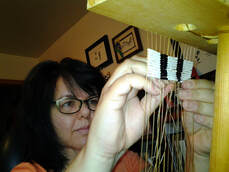© Lynn Gehl, Ph.D. is an Algonquin Anishinaabe-kwe from the Ottawa River Valley. She is a published author of Claiming Anishinaabe: Decolonizing the Human Spirit and The Truth that Wampum Tells: My Debwewin on the Algonquin Land Claims Process. You can reach her and see more of her work at www.lynngehl.com.
3 Comments
nij anangosh
9/2/2020 03:10:47 pm
Chi migwetch, Lynn. Brilliant as always and so timely. 💜
Reply
Rick Tonita
9/3/2020 04:33:35 am
Thank you Lynn for this information. I learned that my version of current reality and worldviews are not necessarily reality. Frantz Fanon stated his definition of cognitive dissonance "Sometimes people hold a core belief that is very strong. When they are presented evidence that works against that belief, the new evidence cannot be accepted. It would create a feeling that is extremely uncomfortable, called cognitive dissonance. And because it so important to protect the core belief, they will rationalize, ignore and even deny anything that does not fit with the core belief." Thank you for all that you do.
Reply
Anne-Marie Hogue
9/4/2020 07:29:25 am
Thank you for this text in which you clarify the difference between methods and methodologies. These are important distinctions and will help all us be more critical when reading documents, texts and books. "An indigenous framework is grounded in indigenous knowledge first." What is important here is what knowledge system or theory or framework is shaping the interpretation. This is important to keep in mind, I can see.
Reply
Your comment will be posted after it is approved.
Leave a Reply. |
|
To subscribe to Lynn's Blog: click here
To subscribe to Lynn's Newsletter: click here To follow Lynn on her Public Facebook Page: click here To subscribe to Lynn's YouTube channel: click here To book Lynn as a speaker: click here To contact Lynn/License her work: click here Copyright Dr. Lynn Gehl, 2024 All Rights Reserved
|

 RSS Feed
RSS Feed
